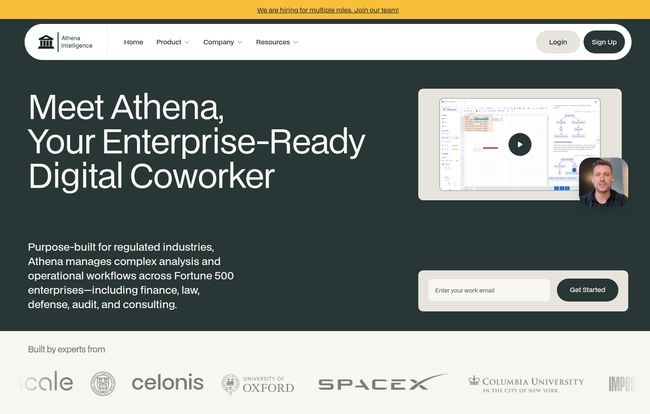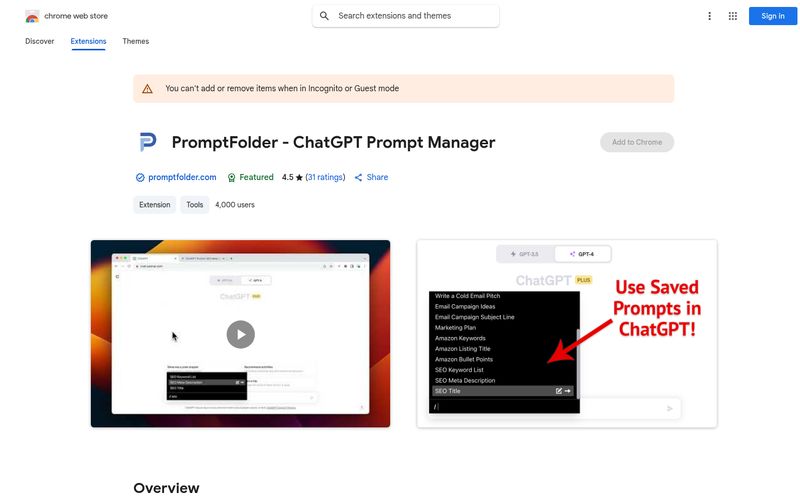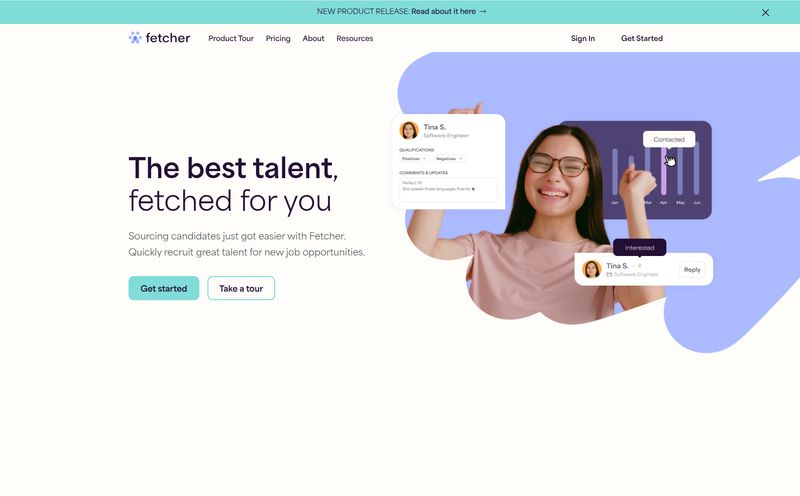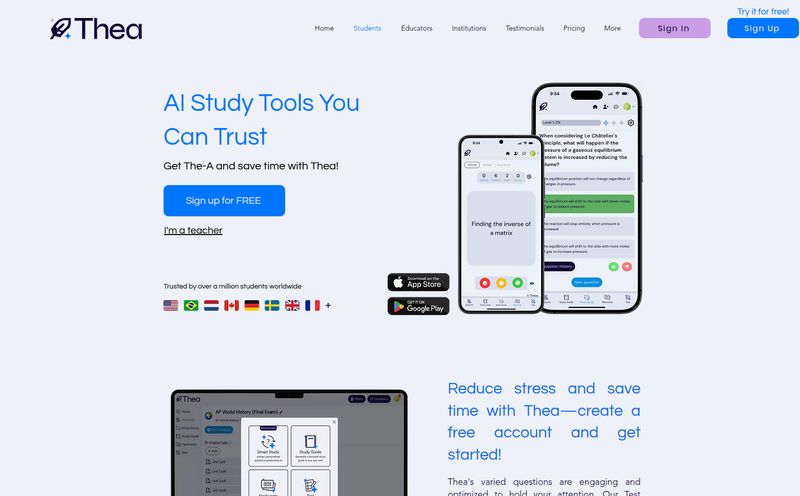I spend my days eyeballs-deep in data, trends, and the tools that promise to make sense of it all. Honestly, it can be a grind. We're all drowning in spreadsheets and dashboards, trying to connect the dots faster than the competition. Every so often, a new platform pops up that makes a bold claim. Most of them are just another variation on a theme. But then I stumbled upon Athena, and the tagline alone—'Your Enterprise-Ready Digital Coworker'—made me sit up a little straighter.
A coworker? Not just a tool, but a coworker. That’s a gutsy claim. It suggests partnership, collaboration, and taking work off your plate. So, I did what any self-respecting SEO and data nerd would do: I went digging. Is this just slick marketing, or is there something genuinely different happening here?
What Exactly Is Athena? More Than Just Another Analytics Platform
At its core, Athena bills itself as an AI-native analytics platform. Think of it less as a rigid dashboard you have to feed with perfectly clean data, and more as a central hub for your entire data operation. The visuals on their site show a platform they call 'Olympus', which looks like a command center that connects to all the places your data already lives—your databases, Google Drive, you name it. It doesn't want to replace your stack; it wants to be the intelligent layer that sits on top of it.

Visit Athena Intelligence
The whole idea is to create an “artificial employee” or an “AI co-pilot” that automates the grunt work. We all know what that is: the endless data cleaning, the repetitive weekly reports, the frantic scramble to pull numbers for an urgent request. Athena's goal is to handle that, so the human analysts—you and me—can focus on the stuff that actually requires a brain: strategy, interpretation, and asking the bigger questions.
The Core Features That Actually Matter
A feature list is just a feature list until you see how it solves a real problem. From what I can gather, Athena’s approach is built around a few key pillars that address some serious pain points for data teams.
Automated and Collaborative Workflows
This is the big one for me. For years, data analysis has often been a weirdly solitary activity. An analyst gets a request, disappears into their cave, and emerges days later with a report. Collaboration usually just means emailing a file named report_final_v3_for_real_this_time.xlsx back and forth. It’s messy.
Athena seems designed to break that cycle. It allows teams to build and run workflows together, in real-time. Everything is tracked, with a complete audit history and even back-in-time controls. For anyone working in finance or another regulated industry, that's not a nice-to-have; it's a must-have. It’s about building a process, not just a one-off analysis.
It Connects To... Well, Everything
I can’t stress this enough: a new tool that forces you to migrate all your data is often dead on arrival. The beauty here is that Athena is designed to plug into your existing world. It connects to any database and integrates with enterprise data sources. This lowers the barrier to entry significantly. You can start getting value without having to orchestrate a massive, painful data migration project. It feels more like hiring a consultant who can get to work with the tools you already have.
Let's Talk Security (Because We Have To)
The moment you mention “AI” and “company data” in the same sentence, the security folks get twitchy. And for good reason. Athena addresses this head-on by offering secure deployment options, including in your own Virtual Private Cloud (VPC). This means your sensitive data never has to leave your own fortified walls. It’s a crucial feature that shows they understand their enterprise audience. They’re not just building a cool toy; they’re building something that a CIO can actually sign off on.
The Claude-3 Integration: Is It Just Hype?
Okay, let's get to the shiny object. Athena recently integrated multi-modal Claude-3. If you’ve been following the AI space, you know that’s a big deal. For the uninitiated, Claude-3 is one of the top-tier large language models from Anthropic, and "multi-modal" means it can understand not just text but also images, charts, and other data formats.
What does this mean in practice? It means you can move beyond clunky SQL queries and start having a more natural conversation with your data. Imagine uploading a chart and asking, “What are the key takeaways from this?” or “Project the Q4 trend based on this pattern.” This is where the “AI coworker” concept starts to feel less like marketing and more like reality. It’s about turning analysis into a dialogue.
Who Is This Really For? Finding the Right Fit
Based on their site, Athena is courting some serious players. They mention being built for regulated industries and have testimonials from hedge fund analysts and VC associates. One analyst, Walter Blain, calls it a “strategic partner,” while a VC, Adam Friedman, describes it as a “10x power-tool for all stages of a deal lifecycle.”
This tells me Athena is aimed at high-stakes environments where speed and accuracy are critical. Think finance, competitive market research, and corporate strategy. It’s for teams that live and die by the quality of their insights. The platform’s motto, “Scale your enterprise with software before headcount,” is a clear message to managers and executives who want to boost their team’s output without doubling their payroll. It’s a productivity play, plain and simple.
The Good, The Bad, and The... Early Access
No tool is perfect, right? From what I can see, here’s my take on the pros and cons.
On the upside, the automation potential is massive. Freeing up analysts from mundane tasks to focus on strategic work is the holy grail of data team management. The collaborative workflows and serious security measures are also huge wins. It’s a platform built for professional, high-functioning teams.
However, there are a few potential hurdles. It’s not a magic wand. It still requires integration with your existing systems, which means you’ll need some technical expertise to get things set up properly. It’s not a tool for a complete beginner with no IT support. The platform is also in early access, which is a double-edged sword. You get to be on the cutting edge and potentially influence the product's direction, but you might also hit a few buggs or find that the documentation is still a work in progress. It’s a tradeoff you have to be comfortable with.
So, How Much Does This AI Employee Cost?
Ah, the million-dollar question. Or, hopefully, a bit less than that. As of right now, there’s no pricing on the Athena website. In fact, the pricing page link leads to a 404 error. This isn't surprising for an enterprise-focused, early-access product. This almost always means they operate on a “Request a Demo” and custom quote basis. The price will likely depend on your team size, data volume, and the specific deployment you need. Don't expect a simple three-tiered SaaS pricing model here; this is for serious enterprise buyers.
Frequently Asked Questions
What is Athena AI?
- Athena is an AI-native analytics platform designed to act as a "digital coworker" for data teams. It connects to your existing databases and helps automate data analysis, create collaborative workflows, and generate insights.
What makes Athena different from other BI tools like Tableau?
- While BI tools are great for visualization, Athena is focused on automating the entire analysis workflow. It's more of an AI co-pilot that helps with the process of getting to the insight, not just presenting the final result. The deep integration of AI like Claude-3 for conversational analysis is a key differentiator.
Is Athena secure for enterprise use?
- Yes, security seems to be a major focus. It offers deployment in your own Virtual Private Cloud (VPC), ensuring that your sensitive company data remains within your own environment. It also provides a complete audit history for all activities.
Who should use Athena?
- It's primarily aimed at enterprise data teams in high-stakes, regulated industries like finance, as well as market research and corporate strategy teams. It's for organizations looking to increase their analytical horsepower without dramatically increasing headcount.
Does Athena really use Claude-3?
- Yes, it features a multi-modal integration of Claude-3, one of today's most advanced AI models. This allows for more sophisticated and natural language-based interaction with your data.
How can I try Athena?
- Currently, Athena is available via an early access program. You can visit their website to request a demo and see if it's a good fit for your team.
The Final Verdict: Is Athena Your Next Hire?
So, back to the original question. Is Athena really an AI coworker? I’m leaning towards a solid maybe. It's more than just a passive tool. By automating workflows, facilitating collaboration, and enabling conversational analysis with advanced AI, it certainly takes on some of the characteristics of a very efficient, very smart team member.
It’s not a solution for everyone. You need a certain level of technical maturity and a real, pressing need for advanced analytics. But for the right team, I can see how Athena could be transformative. It’s part of a bigger trend I’m seeing everywhere: the shift from tools that simply present data to platforms that help you work with data. It’s about giving analysts superpowers, not replacing them. And in a world overflowing with data, who couldn’t use a few superpowers?
Reference and Sources
- Athena Intelligence Official Website: https://www.athenaintelligence.ai/



